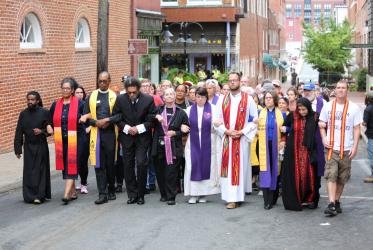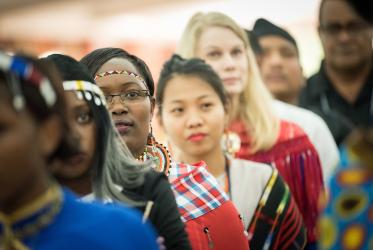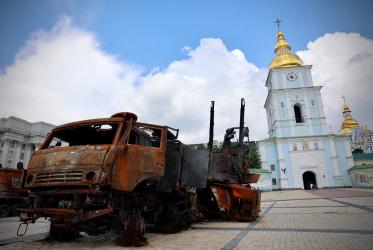It’s 70 years since the World Council of Churches was founded in Amsterdam on 23 August. In addition to a commemoration service in Amsterdam on 23 August, the WCC, its member churches and partners are planning a variety of events to move forward on our ongoing Pilgrimage of Justice and Peace, and at the same time honour and learn from these 70 years of ecumenical endeavour.
The Week of Prayer for Christian Unity, the Conference on World Mission and Evangelism, the WCC Central Committee meeting in Geneva in June, a joint consultation on sustainable development with the ACT Alliance in Uppsala, exactly 50 years after the WCC Assembly there: the anniversary year of 2018 will offer many opportunities to focus firmly on envisioning our common future: united in faith, eager for witness, and fearless in the quest for justice and peace.
Dr Abuom, from the Anglican Church of Kenya, is the moderator of the WCC Central Committee. She holds a doctorate, focusing on the role of NGOs in development work. She first studied at the University of Nairobi then, as a result of political persecution, she later travelled to Sweden, where she earned her doctorate at Uppsala University in missiology using the thesis "The Part of nongovernmental Agencies in Advancement”.
Dr Abuom was elected unanimously by the WCC 10th Assembly to serve as moderator of the WCC Central Committee. She is the first woman and the first African in the position in WCC’s history.
She was recently awarded an honorary doctorate from VID Specialized University, one of Norway’s largest private universities.
Q: Can you reflect on the evolution of the WCC in the past 70 years?
Dr Abuom: The journey of 70 years is one of commemoration, celebration and building on the milestones and lessons for the future. The ecumenical movement has become truly global. Since 1961, issues of unity, mission and justice have become more integrated. The Just Community of Women and Men is increasingly visible in the life of the church, with women assuming leadership roles. Perhaps the greatest impact on social justice issues was evident through the Programme to Combat Racism (the churches accompanying people in their struggles for freedom in Southern Africa). Another case was the support of human rights in Latin America.
As a convening body, the WCC provided space for churches from former communist and socialist countries to connect with the rest of the world. The Lima document of Faith and Order famously known as: “Baptism, Eucharist and Ministry” was a landmark.
We should also remember the humanitarian work in Europe and reconciliation efforts. WCC was and remains a voice in the public space on matters of socio-economic development. The work on the church of the poor provided a basis for participatory and people-centred development. Thus, WCC held multilateral agencies accountable, including the United Nations.
Q: What would you wish for in the coming 40 years?
Dr Abuom: For the coming 40 years, we must debunk the dominion theology of consumerism that has relegated "mother earth” to an instrument of exploitation by a few individuals driven by the notion of greed. We must embrace global citizenship and a global community, and we must care for one another and the earth for the sake of posterity. I wish that, for the next 40 years, humanity will acknowledge the pilgrim nature of life and, further, that spirituality will be the bedrock of future generations and not materialism.
Q: Would you wish for the future?
Dr Abuom: I also dream of a world where every man and woman’s dignity will be upheld. A world where every person’s basic needs will be secured. I dream of a world where there will be no racial discrimination, negative ethnicity and xenophobia as well as related violence. Indeed, a world free of sexual and gender violence.
Like Abraham and the people of old, borders will not deny anyone the right to freely move without being profiled. Rather, systems and rule of law will be effective to deal with criminals. I dream of a global world without borders and, at the same time, security for people who want or need to move around.
Q: As you meet and talk with youth during your travels, do you see clear differences between their interests?
Dr Abuom: The bottom line is that I see youth around the world reaching for hope and direction for their destiny. There are a few differences - such as the levels of unemployment and desperation. But in general youth are struggling with finding space in our ecclesial bodies, in public space and in defining their destiny. Their response to the challenges is where the difference lies.
Q: What should be the outcome of the youth gatherings in 2018?
Dr Abuom: First, we should empower youth to celebrate icons of the ecumenical movement who, in their youth, left landmarks and on whose shoulders we now stand. These icons should not just be celebrated but should also be a basis to inspire youth. Second, young people can restore embodied solidarity among themselves as they increasingly are networked globally but not actively connected. Third, we need clarity in discerning the role and direction youth can play in the age of technology and in combatting nationalism and xenophobia.
Q: What influences shaped you when you were about 20 years old?
Dr Abuom: The liberation struggle of Southern Africa helped me during the protests organized by National Council of Churches in Kenya. My high school experience in a multi-racial school also influenced me. Limuru Girls’ School opened my eyes to appreciate whites, Indians and Kenyans of other languages and cultures. Finally, my experience as a student leader struggling against injustice in Kenya denied me the opportunity to complete my university education. Of course imprisonment in 1989 in pursuit if human rights solidified my quest, commitment, and respect for human dignity.
A short prayer for the future of the world
by Dr Agnes Abuom
Almighty God, thank you for making each one of us in your own likeness, from the south, the north, the east and the west. Yet, God, when I look around, I see wounds, broken communities, walls of separation. My eyes hurt when the creation you so love and cherish is abused and misused. I hear the cries of the men and women; boys and girls in the slave markets, on the run from violence; shouting: “Where is God?”
Almighty God forgive us because we have refused to see you in our neighbours, in the faces of the strangers. Almighty God, help us to open our hearts and doors to share your love with the poor materially, to speak truth in humility to the poor rich; to be present with the elderly and lonely people. God our creator, hear our prayer and have mercy.
Loving God, we thank you for your church and the fellowship we experience within the ecumenical movement. We thank you for the courage and wisdom you gave to the founding fathers and mothers. Grant us inspiration and knowledge to pursue the unity of your church in accordance with your prayer “that they may be one so that the world may believe.” Forgive us for commercializing your word and transform and renew our minds so that we can be agents and servants of the good news in a world fraught with pain and suffering. Guide us to bring hope amidst hopelessness, love instead of hatred, and peace instead of conflict. Break down the walls and exorcise the demons of greed and division. May your light shine!
[Editor’s note: The material above was originally prepared for the Council of Churches in the Netherlands to promote its 2018 jubilee celebration, part of which focuses on recognizing the hopes and aspirations of young people. WCC Communications has reformatted the material into an interview to share it on a global level.]
For more information about the WCC 70th anniversary: www.oikoumene.org/wcc70










